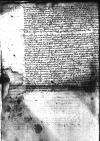List #3450
[Ioannes DANTISCUS] do UNKNOWN [Ermland (Warmia) Canon?]Heilsberg (Lidzbark), 1548-10-17
Rękopiśmienne podstawy źródłowe:
Pomocnicze podstawy źródłowe:
| ||||||
Tekst + aparat krytyczny + komentarz Zwykły tekst Tekst + komentarz Tekst + aparat krytyczny
Venerabilis etc.
Gratum mihi fe paper damaged⌈[um mihi fe]um mihi fe paper damaged⌉cit Dominatio Vestra plurimum, quod me ex hoc dubio, de quo nuperrime colloquebamur, cum cf.
Contiones illas excusas quamprimum perlegero, ut Dominatio Vestra habeat, cum primis curabo.
Rediit ex aula nuntius meus, hinc qui exiverat XXII Septembris, sed de
Qui ut et Dominationem Vestram diu sospitet, ex animo precor.
Dat(ae) or Dat(um)⌈Dat(ae)Dat(ae) or Dat(um)⌉

 AAWO, AB, D.70, f. 391v
AAWO, AB, D.70, f. 391v